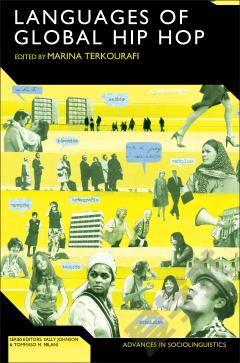The Languages of Global Hip Hop
In the case of hip-hop, the forces of top-down corporatization and bottom-up globalization are inextricably woven. This volume takes the view that hip-hop should not be viewed with this dichotomous dynamic in mind and that this dynamic does not arise solely outside of the continental US. Close analysis of the facts reveals a much more complex situation in which market pressures, local (musical) traditions, linguistic and semiotic intelligibility, as well as each country's particular historico-political past conspire to yield new hybrid expressive genres. This exciting collection looks at linguistic, cultural and economic aspects of hip-hop in parallel and showcases a global scope. It engages with questions of code-switching, code-mixing, the minority language/regional dialect vs. standard dynamic, the discourse of political resistance, immigrant ideologies, youth and new language varieties and will be essential reading for graduates and researchers in sociolinguistics and discourse analysis.
{{comment.content}}








 京公网安备 11010802027623号
京公网安备 11010802027623号